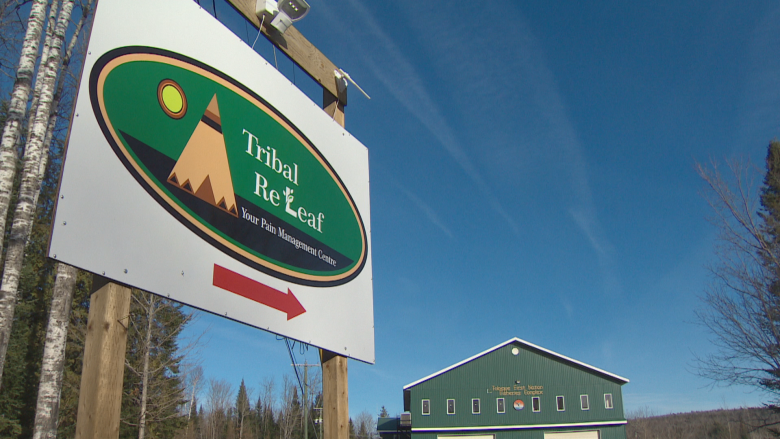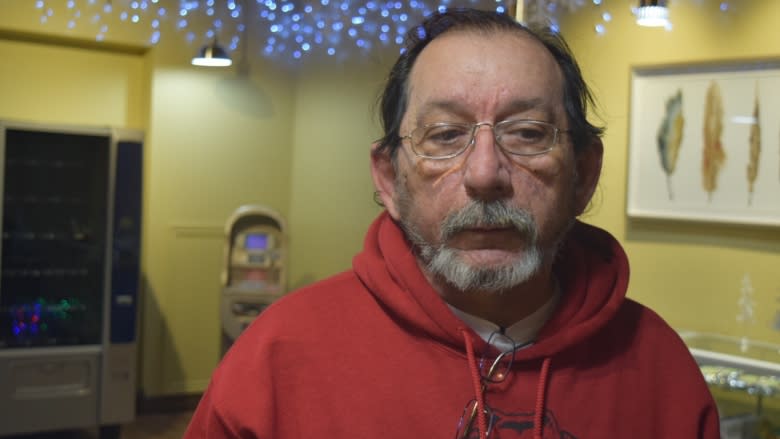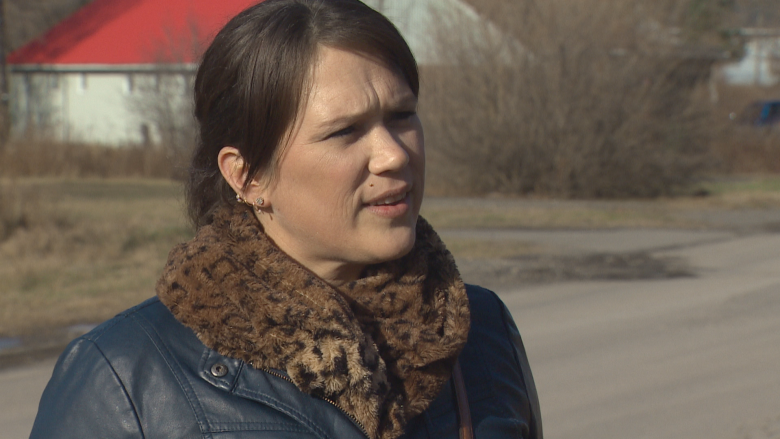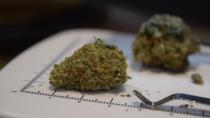'We're either a government or we aren't': Anger mounts on Tobique since dispensary raid
Tobique First Nation has simmered with anger since RCMP raided a medical marijuana dispensary, a business the band council backed as a path to healing in a community afflicted with drug abuse.
The early October raid on Tribal ReLeaf brought out 50 protesters, who formed a blockade to stop the RCMP from leaving the reserve with dispensary products.
The Mounties were allowed to pass and the dispensary reopened within hours.
But the raid struck at the core of the Maliseet community's convictions about Indigenous self-government.
- Tobique marijuana dispensary raid came close to 'full-out conflict,' chief says
- NB Liquor to sell recreational cannabis in stand-alone pot stores
For some observers, the extent that self-governance applies in this case is uncertain.
For Tobique First Nation, a rigid and well-defined line exists, and the RCMP crossed it.
"Our laws, our laws," said Gerald Bear, who runs Tribal ReLeaf. "Your laws, your laws."
Bear said fury persists over the RCMP intrusion into band business.
"There are people angry," he said. "Just look at the optics. You're running a First Nations-owned pain management centre, regulated by our chief and council. Our government."
Medicinal marijuana dispensaries are illegal everywhere in Canada, and only suppliers approved by Health Canada can fill prescriptions.
Tribal ReLeaf isn't the first dispensary to go ahead anyway, despite the federal regulation, but it's different from most others in a significant way: it has the support of the local government, in this case the chief and band council.
Before Tribal ReLeaf was set up, the band council passed a motion allowing designated persons on the reserve to possess, produce and distribute marijuana for medicinal purposes.
Not only was Tribal ReLeaf set up with council's blessing, the community owns 51 per cent of it.
The City of Vancouver has also adopted bold bylaws involving medical marijuana.
Tobique Chief Ross Perley says the First Nation has the right to take its future into its own hands, whether it's to solve economic problems or rampant painkiller abuse, the latter a New Brunswick-wide problem.
The raid on Tribal ReLeaf represented a lack of respect for Indigenous rights, he said, and undercut an autonomous government.
"We believe in self-government and self-determination and we license our own operations," the chief said
The council's goal with Tribal ReLeaf is to reinvest money in the community and help wean residents off painkillers such as opioids, which Bear calls an "epidemic" on the reserve.
He said the dispensary is a more personal way for the community to heal itself — an alternative to Western medicine, which some First Nations allege can be disrespectful of traditions or even discriminate against them.
When band members walk into the dispensary, he said, clerks will likely already know their background. Community members can apply to join Tribal ReLeaf; outsiders need a prescription from a doctor.
Additionally, the store hosts activities such as workshops for anxiety.
"This is our territory," Bear said. "We'll deal with our own problems. Nobody else has dealt with them."
The right to self-govern
When Perley and Bear talk about an Indigenous right to self-government, they cite Section 35 of the Constitution Act of 1982, which affirms Indigenous and treaty rights, including the Peace and Friendship treaties the Maliseet Nation signed in earlier centuries.
The Indian Act is another common basis for self-governance claims, they said.
Although the act prohibits band councils from violating federal law, it says they can pass bylaws "to provide for the health of residents."
The provincial Finance Department views the medical marijuana sold by Tribal ReLeaf as illegal.
"Dispensaries are illegal no matter where they are located," Sarah Bustard said on behalf of the department.
And because Tribal ReLeaf lacks the required licensing from Health Canada, it should expect enforcement of federal laws, the RCMP said.
People are consuming substances that could have ill or dangerous effects," said RCMP spokeswoman Cpl. Jullie Rogers-Marsh.
Law professor weighs in
John Borrows, the Canada Research Chair in Indigenous law at the University of Victoria, said Section 35 of the Constitution, in theory, could be the basis for an Indigenous group to claim self governance, but courts have deemed, "such rights are not general in nature."
Tobique would have to show that whatever the council claimed it should regulate — in this case medicinal marijuana — was somehow in line with being either "integral to their distinctive culture" prior to European arrival or recognized in a treaty.
"The courts have not been receptive to Indigenous peoples' framing of their self-governance rights in a broader way," the law professor said.
'Complex issue'
A spokesperson for the federal Finance Department said the situation isn't as clear-cut as people on both sides might believe.
"An Indigenous people or nation establishing their own regulations related to cannabis is a potentially complex issue," Ian McLeod wrote in an email, noting the various ways a group might claim self-governance.
"The Government of Canada is continuing to engage in discussions with Indigenous peoples as part of its continuing efforts to facilitate the implementation (of forthcoming legislation)."
The Assembly of First Nations has formed a national working group on cannabis. The assembly wants the group to assist First Nations across Canada to be engagement-ready and in a better position to assert their rights, title and interests when the new cannabis legislation comes into effect."
Chief Ross Perley sees breach
But Chief Perley said the reserve needs to make a stand.
"We're either a government or we aren't," he said. "If we don't take control as a government in our community, then the federal and provincial government will try to do that for us."
"Our position is, we define who we are, what bylaws we have here in the community, and we regulate them."
On top of the constitutional issue, Perley said the RCMP broke a communication protocol it had with the chief and council when officers showed up at the dispensary with a warrant.
The protocol says the RCMP are supposed to communicate with leadership to try to resolve an issue before taking any action.
This didn't happen, Perley said.
A kick from the province as well
The province's decision to set up a recreational cannabis store 10 kilometres away in Perth-Andover added insult to injury, according to the band council, and was just another time a chair wasn't given to First Nations at the discussion table.
The Perth-Andover shop is just one of the stand-alone stores NB Liquor plans to run throughout the province when the drug becomes legal next July.
Perley said the province didn't consult the band about the plan.
"Historically, they've chosen not to include us in these opportunities, which is fine with us," he said. "We're just going to do our own thing."
The province said it invited First Nations to consultation meetings held by a touring committee of MLAs last summer, although none of those meetings took place on a reserve or directly dealt with Indigenous concerns.
Perley and Bear said the reserve wants to take control of its own economic situation after feeling neglected for so long.
"If they were true to the nation-to-nation-building perspective, they would have said, 'First Nations have a role to play in this,'" said Bear.
Standing at the roadside near the centre of the reserve, community member Theresa Solomon recalled the dispensary raid. The Mounties ordered her to move her vehicle that day, saying she was obstructing justice.
"I walked away to gather with my community members who were really upset," she said to explain how the blockade got underway.
A court case might strengthen the band's claims to self-governance, she said, although so far, no charges have been laid against the dispensary.
Whatever happens, the community is ready to defend its dispensary and the symbolism it carries, she said.
"It's not going anywhere. It's our shop."












